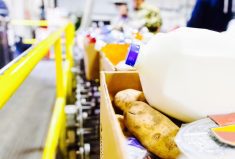Millennials now outnumber boomers in our country, says Statistics Canada. As of July 1, 2023, the millennial population (born in 1981-1996), has surpassed baby boomers (born in 1946-1965) for the first time.
Likewise, generation Z (born in 1997-2012) has surpassed generation X (born in 1966-1980) to become Canada’s third-largest generation and is projected to become the largest within the next 30 years.
The implications of a growing and younger population for the food industry are multifaceted.
Read Also

Trade uncertainty is back on the Canadian national menu
Even if CUSMA-compliant goods remain exempt from Trump’s new tariffs for now, trade risk for farmers has not disappeared, Sylvain Charlebois warns.
Millennials are distinct from past generations in their racial diversity, higher education and technological literacy. They also face financial hardships later in life, unlike previous generations that typically encountered a challenging job market or an unforgiving economy at a younger age.
Now at their economic prime and at the age to start families, millennials are feeling the financial pinch from higher interest rates and rents. After a period of low unemployment and cheap money, this generation is facing a severe financial reality check.
This is evident in their grocery shopping habits. Over 86 per cent of millennials are actively seeking discounts and over 66 per cent have switched primary grocery stores in the last 12 months to find better deals — both percentages being the highest of all generations.
Additionally, 43 per cent are using food-rescuing apps to buy expiring food at a discount, again the highest usage percentage of all generations. The economic and financial transition millennials had to navigate has been drastic.
Previously, millennials frequented specialty stores, seeking fresher, natural, environmentally conscious food with clean labels. However, their new financial reality has forced a shift in priorities.
Those values will not disappear, though, and as millennials recover fiscally, they will shape the food industry.
Millennials’ preferences for ethnically diverse food and snacking will continue to influence grocers and food service operators. Our recent survey found that 28.3 per cent of millennials often replace meals with snacks, compared to just 8.7 per cent of baby boomers.
Millennials rely on friends and family as their primary source of information about food, unlike boomers, who turn to health professionals. They also pay close attention to food labels.
Supported by social media, millennials have challenged the food industry, advocating for clean labelling, better sourcing of ingredients and healthier options.
As the food industry adapts to these evolving preferences, it will also need to anticipate emerging trends brought by generation Z. Gen Z’s values, shaped by their digital-native upbringing and heightened social and environmental awareness, will further push the industry toward transparency, sustainability and innovation.
For instance, gen Z’s preference for alternative protein sources is likely to accelerate the shift toward more sustainable food production. Their comfort with technology will also drive the adoption of online grocery shopping and food delivery services, which saw a surge during the pandemic.
Moreover, gen Z’s emphasis on authenticity and experience may lead to a rise in experiential dining and unique food offerings. They are also more likely to support local and small-scale producers, aligning with their values of sustainability and community.
Understanding and adapting to these generational shifts will be crucial for businesses in the food sector to stay relevant and thrive in the years to come.















